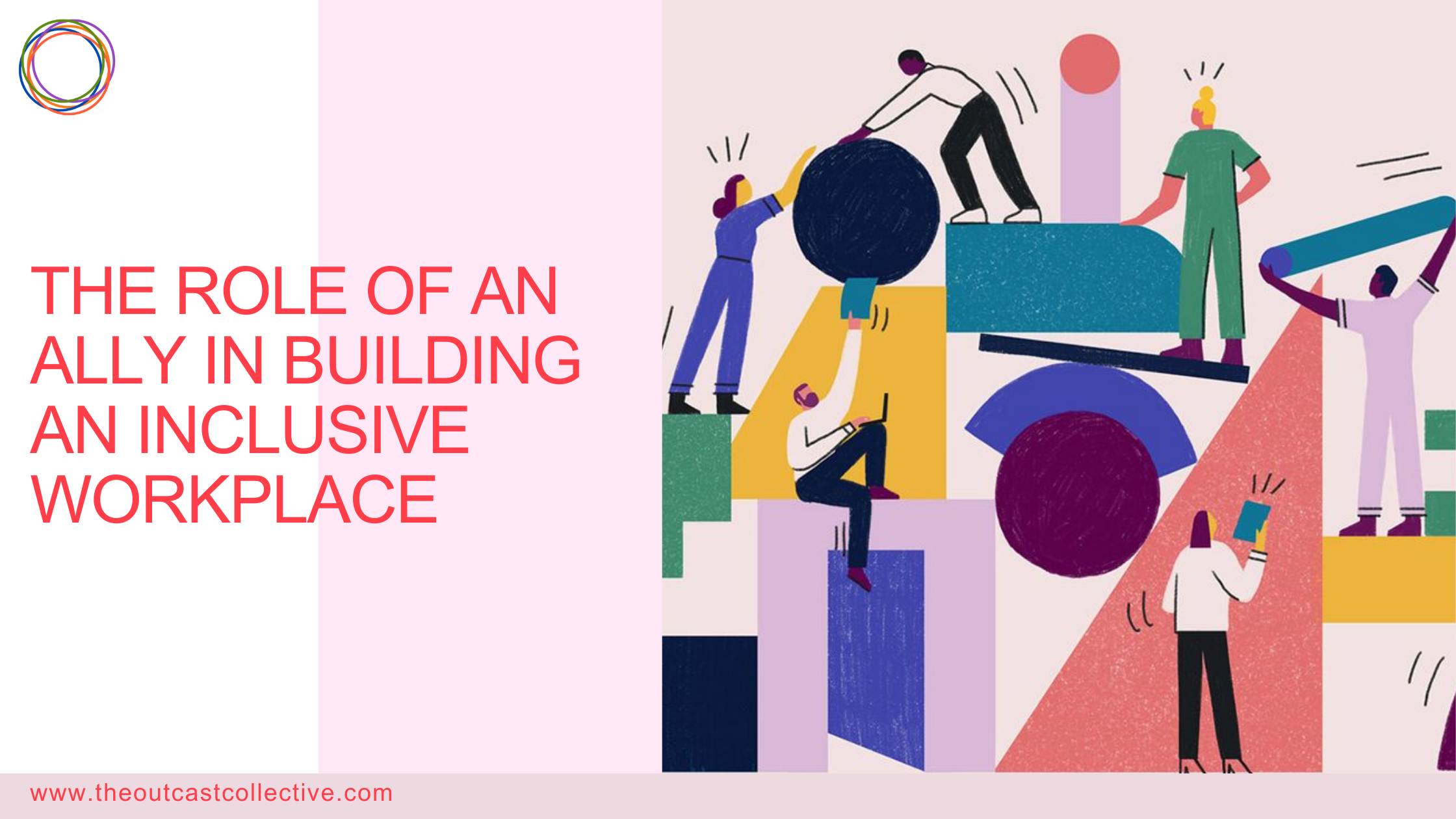Jun 5 2024 | theoutcastcollective
In today’s diverse and interconnected world, fostering an inclusive workplace has become more crucial than ever. An inclusive workplace not only benefits employees by creating a supportive and welcoming environment but also enhances the overall performance and reputation of an organization. Allies play a pivotal role in building and sustaining such an environment, transcending beyond mere solidarity during events like Pride Month. Here’s a closer look at the role of an ally in creating an inclusive workplace.
Understanding the Role of an Ally
An ally is someone who actively supports and advocates for marginalized groups, using their privilege to promote equality and inclusion. In the workplace, allies are essential in driving change, addressing biases, and creating a culture where everyone feels valued and respected. Their role extends beyond symbolic gestures and involves concrete actions that contribute to a truly inclusive environment.
Actions Allies Can Take to Build an Inclusive Workplace
- Educate Themselves: Allies must take the initiative to learn about the experiences, challenges, and histories of marginalized groups. This involves reading books, attending workshops, and engaging with content created by those within these communities. By participating in an inclusive training program, allies can become more empathetic and effective in their advocacy.
- Speak Up Against Discrimination: It’s vital for allies to actively challenge discriminatory behavior and language in the workplace. Whether it’s addressing a harmful joke, calling out biased practices, or confronting microaggressions, allies need to use their voice to stand against inequality. This not only supports the affected individuals but also sets a standard for acceptable behavior within the organization.
- Promote Inclusive Policies: Allies can advocate for the adoption and implementation of inclusive policies and practices within the organization. This includes supporting diversity training programs, pushing for equitable hiring practices, and ensuring that company policies protect and support all employees. Consulting with a diversity and inclusion consultant or DEI consultant can help institutionalize inclusivity.
- Support Employee Resource Groups (ERGs): Employee Resource Groups are vital in providing support and networking opportunities for marginalized employees. Allies can contribute by participating in these groups, offering resources, and promoting their initiatives. Their support can amplify the voices of ERG members and help in achieving their goals.
- Mentor and Sponsor Marginalized Employees: Allies can use their positions of influence to mentor and sponsor individuals from marginalized groups. This involves providing guidance, advocating for their advancement, and helping them navigate career opportunities. By doing so, allies can help bridge gaps in representation and leadership within the organization.
- Create Safe Spaces: It’s essential to foster an environment where employees feel safe to express their identities and experiences. Allies can contribute by encouraging open dialogues, ensuring confidentiality, and creating forums where everyone feels heard and respected. This inclusive atmosphere enables employees to bring their whole selves to work.
- Celebrate Diversity Year-Round: While events like Pride Month are important, allies should ensure that the celebration and recognition of diversity are ongoing. This includes recognizing cultural events, celebrating achievements of diverse employees, and continuously promoting an inclusive culture throughout the year.
- Listen and Learn: One of the most powerful actions an ally can take is to listen to the experiences and needs of marginalized employees. This involves actively seeking feedback, being open to learning from others, and adapting actions based on what they hear. Listening with empathy and respect can build trust and strengthen allyship.
The Impact of Allyship
The active participation of allies in creating an inclusive workplace leads to numerous benefits. It helps in reducing discrimination, improving employee morale, and fostering a culture of mutual respect and collaboration. Inclusive workplaces tend to attract diverse talent, enhance creativity, and drive innovation, ultimately contributing to the organization’s success.
Conclusion
Allyship is a continuous and active process that requires commitment, education, and action. By going beyond symbolic gestures and embracing their role in fostering inclusivity, allies can significantly contribute to building a workplace where diversity is celebrated, and everyone feels valued. This not only benefits marginalized employees but also creates a thriving, dynamic, and successful organization.
By integrating inclusive training programs, engaging with a diversity and inclusion consultant, and committing to the principles of inclusion and diversity in the workplace, allies can play a transformative role in shaping a more equitable and supportive work environment.
About the Outcast Collective
Our team at, The Outcast Collective, specializes in offering DEI Consulting, POSH compliances, training programs, and policy drafting with open forums and dialogues on diversity, equity, and inclusion. Our goal is to help organizations break free from binary thinking and cultivate inclusive work cultures that drive productivity and harmony.
Join us as we strive for a future of inclusivity where every voice is acknowledged, and each person is respected. Contact us today via WhatsApp at +91- 98215 10581 for DEI and +91- 89280 21419 for POSH to discuss your DEI status, organisational needs and embark on your journey to a sustainable and inclusive workplace.
